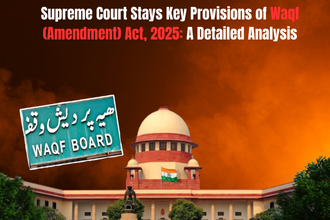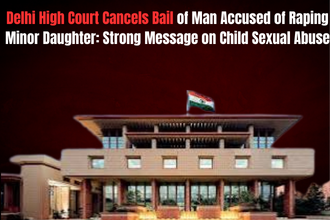Introduction
On September 15, 2025, the Supreme Court of India delivered an important interim order on the Waqf (Amendment) Act, 2025, staying certain provisions of the law while refusing to suspend its entire operation. The Act, which significantly alters the regulatory framework for Waqf properties in India, has been challenged by multiple petitioners, including Members of Parliament and Waqf bodies, who argue that it violates the community’s constitutionally guaranteed right to manage its religious affairs.
This article provides a detailed breakdown of the Court’s ruling, the contested provisions, arguments from both sides, and the implications of this interim order.
Background of the Waqf (Amendment) Act, 2025
The Waqf Act, 1995 was enacted to regulate properties dedicated for religious or charitable purposes under Islamic law. Over the years, several disputes arose regarding unauthorized claims, encroachments, and alleged misuse of Waqf properties. To address these issues, the Waqf (Amendment) Act, 2025 was passed by:
- Lok Sabha on April 3, 2025
- Rajya Sabha on April 4, 2025
- Received Presidential assent on April 5, 2025
The Act introduced major changes, including the removal of the concept of “waqf by user”, new restrictions on who can dedicate property as waqf, and the inclusion of non-Muslim members in Waqf councils and boards.
Supreme Court’s Interim Order: Key Highlights
The Bench comprising Chief Justice of India (CJI) BR Gavai and Justice Augustine George Masih clarified that while a case had not been made out for staying the entire amendment, certain provisions were stayed to prevent arbitrary implementation.
1. Stay on 5-Year Muslim Practice Requirement
- Provision: Section 3(r) mandated that only a person who has been a practicing Muslim for 5 years could dedicate property as waqf.
- Court’s View: Since no rules or mechanism exist to verify whether a person is a practicing Muslim, the provision could lead to arbitrary decision-making.
- Ruling: The provision is stayed until the State frames clear rules for implementation.
2. Collector’s Adjudicatory Powers Stayed
- Provision: The Amendment gave Collectors authority to adjudicate certain Waqf property disputes.
- Court’s View: Allowing executive officers to decide property rights would violate the principle of separation of powers.
- Ruling: The power remains stayed, and adjudication will rest with tribunals until the matter is finally decided.
3. Registration of Waqf Properties Not Stayed
- Court’s Observation: Registration of Waqf properties has existed since 1995–2013 and is not a new requirement.
- Ruling: The requirement to register Waqf properties remains valid, though the Court noted flexibility may be required regarding the time limit.
4. Appointment of Ex-Officio Members
- Provision: Section 23 deals with the appointment of ex-officio members, including the CEO of Waqf Boards.
- Court’s Direction: As far as possible, such officers should be appointed from the Muslim community, though the provision itself was not stayed.
5. Inclusion of Non-Muslims in Waqf Bodies
- Court’s Clarification:
- Central Waqf Council can have a maximum of 4 non-Muslims out of 22 members.
- State Waqf Boards can have a maximum of 3 non-Muslims out of 11 members.
Petitioners’ Arguments Against the Amendment
The petitions, filed by MPs like Mohammad Jawed (Congress) and Asaduddin Owaisi (AIMIM) along with other stakeholders, contend that:
- Targeted Legislation: The amendments selectively interfere with Muslim religious endowments, violating Article 25 and Article 26 of the Constitution.
- Omission of Waqf by User: Historical mosques, graveyards, and charitable endowments that were functioning for centuries without formal waqf deeds would lose recognition, threatening their existence.
- Collector’s Powers: Allowing executive officials to decide property disputes would *strip judicial safeguards.
- Inclusion of Non-Muslims: Dilutes the autonomy of Waqf Boards and undermines the community’s right to manage its religious affairs.
Government’s Stand on the Waqf (Amendment) Act, 2025
The Union Government, represented by Solicitor General Tushar Mehta, defended the Act as a much-needed reform:
- Preventing Misuse: The law is aimed at preventing the misappropriation of Waqf properties and blocking unauthorized claims.
- Exclusion of Waqf by User: This does not prevent dedication of property but ensures proper documentation and transparency.
- Inclusivity: The presence of non-Muslims in Waqf bodies is minimal and designed to foster inclusive governance.
- Tribal Land Protection: Many tribal lands, the SG argued, were being illegally claimed as Waqf properties, which the new law seeks to prevent.
Political and Social Reactions
- Muslim Community Leaders: Expressed concern that the law erodes centuries-old traditions and interferes with religious self-governance.
- Opposition Parties: Criticized the law as discriminatory and unconstitutional, designed to undermine minority rights.
- BJP-Ruled States: Six states — Haryana, Maharashtra, Madhya Pradesh, Rajasthan, Chhattisgarh, and Assam — supported the law, filing applications to back the Centre in the Supreme Court.
Constitutional Significance
The case raises critical constitutional questions:
- Does the exclusion of waqf by user violate the right to religious freedom under Articles 25 and 26?
- Can the executive (Collector) be given quasi-judicial powers to determine property rights?
- To what extent can the State interfere in the internal management of religious institutions?
The Supreme Court’s prima facie observations indicate caution in allowing unchecked executive powers while maintaining the regulatory framework for transparency.
Conclusion
The Supreme Court’s interim order on the Waqf (Amendment) Act, 2025 strikes a balance between regulation and religious autonomy. By staying provisions that lacked procedural safeguards, such as the 5-year Muslim practice requirement and Collector’s adjudicatory powers, the Court has protected against potential arbitrariness. At the same time, by upholding registration requirements and limiting but not excluding non-Muslim representation, the Court has recognized the government’s regulatory intent.
As the matter proceeds for final adjudication, the outcome will have a significant impact on the future of Waqf properties in India, minority rights, and the delicate balance between State regulation and religious freedom.



